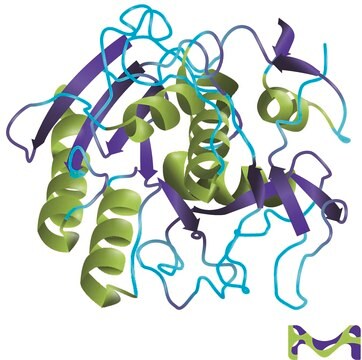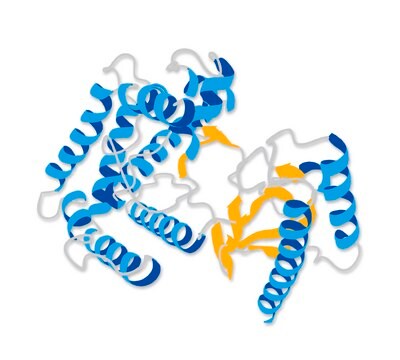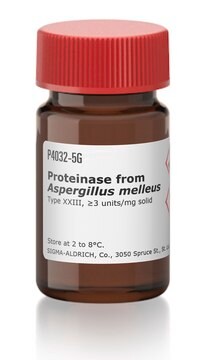P4850
Proteinase K from Tritirachium album
buffered aqueous glycerol solution, for molecular biology, ≥800 units/mL
Synonym(s):
Endopeptidase K
About This Item
Recommended Products
grade
Molecular Biology
for molecular biology
Quality Level
form
buffered aqueous glycerol solution
mol wt
28.93 kDa
concentration
≥10 mg/mL
≥800 units/mL
impurities
≤0.5 ppm DNA (PicoGreen® assay)
foreign activity
DNase, Nickase and RNase, none detected
storage temp.
2-8°C
Looking for similar products? Visit Product Comparison Guide
Application
- in bovine endometrial epithelial cells for herpes viral DNA extraction
- for viral RNA extraction from nasal swabs
- as a component of phase lock and direct PCR lysis buffer
Removes endotoxins that bind to cationic proteins such as lysozyme and ribonuclease A.
Reported useful for the isolation of hepatic, yeast, and mung bean mitochondria
Determination of enzyme localization on membranes
Treatment of paraffin embedded tissue sections to expose antigen binding sites for antibody labeling.
Digestion of proteins from brain tissue samples for prions in Transmissible Spongiform Encephalopathies (TSE) research.
Biochem/physiol Actions
Unit Definition
Physical form
Legal Information
Signal Word
Danger
Hazard Statements
Precautionary Statements
Hazard Classifications
Resp. Sens. 1
Storage Class Code
10 - Combustible liquids
WGK
WGK 2
Flash Point(F)
Not applicable
Flash Point(C)
Not applicable
Personal Protective Equipment
Choose from one of the most recent versions:
Already Own This Product?
Find documentation for the products that you have recently purchased in the Document Library.
Customers Also Viewed
Articles
The use of Pro K in combination with other reagents, such as detergents and chaotropic agents, can help to disrupt the cell membranes and release DNA from tissue. This is particularly important for downstream applications such as PCR, sequencing, and other molecular biology techniques that require pure and intact DNA.
Proteinase K is commonly used in molecular biology and biochemistry applications to digest structural proteins and enzymes. It is useful in removing nucleases that can degrade DNA and RNA, as well as in the isolation of intact genomic DNA from various sources.
The cost of proteinase K can vary depending on the source, purity, manufacturing process and vendor’s quality management system. It is important to balance the cost with the desired quality, performance, documentation and technical/quality support to select the optimal Proteinase K for the intended application
In blood DNA extraction, Proteinase K, an enzyme commonly used to degrade proteins, can help break down the cellular and nuclear membranes, releasing DNA from the cells that protect it from degradation and increase purity/yield making it more suitable for various molecular biology techniques.
Protocols
Proteinase K (EC 3.4.21.64) activity can be measured spectrophotometrically using hemoglobin as the substrate. Proteinase K hydrolyzes hemoglobin denatured with urea, and liberates Folin-postive amino acids and peptides. One unit will hydrolyze hemoglobin to produce color equivalent to 1.0 μmol of tyrosine per minute at pH 7.5 at 37 °C (color by Folin & Ciocalteu's Phenol Reagent).
Our team of scientists has experience in all areas of research including Life Science, Material Science, Chemical Synthesis, Chromatography, Analytical and many others.
Contact Technical Service








